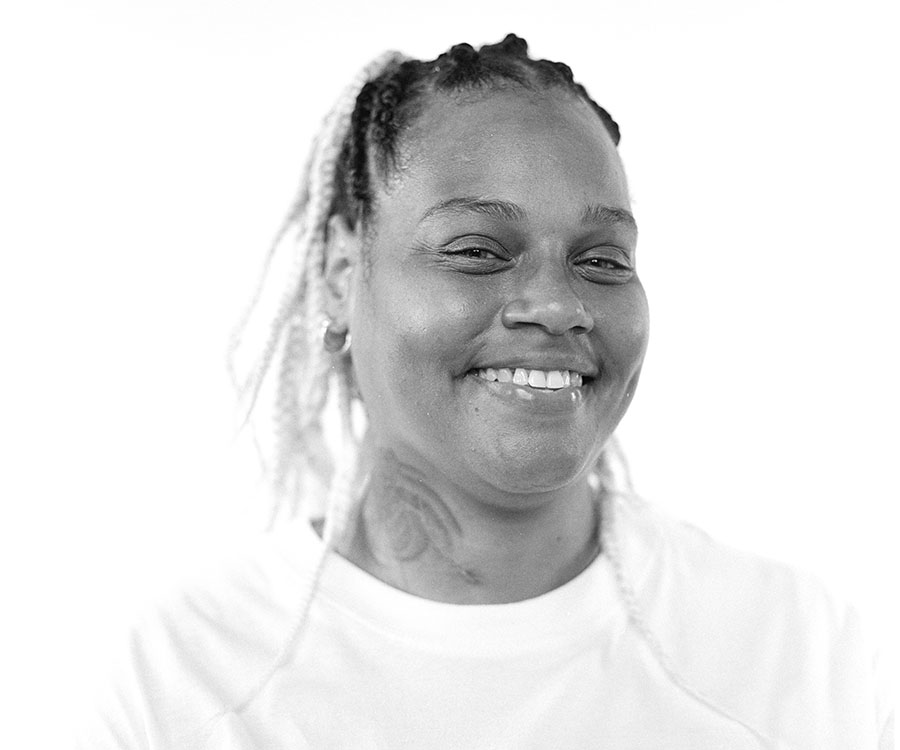
Since she was five, helping to raise her baby sister, Tamika Rivera-Stokes has been helping people. Now 43, she opens her home to friends and family in need; she cooks meals for neighbors, and she connects people with the goods they need from donations at House of Mercy.
She discovered HOM as many volunteers do—when she needed help herself. That was five years ago, when she used the shelter’s pantry to feed her family of four. Tamika had been out of work due to a back injury and unsuccessful spinal fusion surgery. She was in constant pain, she says, and trying to make ends meet. HOM was there for her.
When she was feeling better enough she started volunteering daily folding and sorting clothes in HOM”s warehouse at 10 Woodward St. Unlike Goodwill retail stores, where donations get sold for a price, Tamika says the warehouse allows people in need to shop for donated goods without having to pay anything. And any clothes or shoes that aren’t used, she adds, go to Planet Aid, a nonprofit that collects such items and ships them to some of the poorest parts of the world.
At the warehouse Tamika connects people with the donated furniture they need, clothes, pots and pans, dishes—but also social services, not to mention emotional support. She recalls a family of 10 whose house recently burned down. She helped the family outfit their next house with furniture, beds and kitchenware.
From donations, Tamika found kids’ clothes, shoes, socks and underwear and helped put the family in touch with the right contacts to get them back on their feet. It was the second time Tamika had helped the family.
“The mother, sometimes she has anxiety,” Tamika says. “She sometimes can’t talk (because of it). She likes coming to me because I calm her down. I told her she can always call me.”
Tamika has helped a lot of mothers, especially pregnant women. She remembers her own anxiety, pregnant with her first child, going from church to church for clothes. It was hard, she says, but her troubles pale in comparison to the stories she hears at House of Mercy. It makes her cry to see people suffering, to see them disrespected.
The people Tamika helps stay in touch with her. They call or show up at the warehouse to chat. They send cards thanking her. She says people crave the understanding and patience volunteers at House of Mercy give.
But sometimes they’re angry, Tamika says: Sometimes people have been disrespected over some incident earlier in the day. Maybe they’ve been abused or kicked out of their house. They’re at their wit’s end and occasionally Tamika finds herself on the receiving end of their frustrations.
“A few cuss in my face and want to push my buttons to get what they want instead of following the rules,” Tamika says. “I’m patient with them even when they’re acting out at the warehouse. I’m more patient knowing how their mind is set. I still help them, even though they’re impatient or confused, or they don’t know how to read. I look for clothes with them. I help them with their sizes.”
At House of Mercy, Tamika says patience is the most valuable lesson she’s learned. “I have asked myself, ‘Do I want to be the same Tamika I was grown-up, lashing out, being angry when someone disrespected me?’ I taught myself: ‘Calm down, flip it, make it better.’”
At HOM, she doesn’t cut people off when she thinks they’re just giving her an excuse. She lets people vent, and oftentimes they come back later with an apology.
In the moment, people can reach their breaking point in reaction to an overload of disrespect. Tamika gives the example of a man who told her about an argument at an Alcoholics Anonymous meeting earlier in the day. Another man had lunged at him and nearly punched him.
“He told me about how he had to compose himself so he didn’t go to jail,” Tamika says. She says she doesn’t always know what to say in the moment but in this one, she reminded the man that his heart was in the right place. He was trying to be real in a meeting, and the truth hurt the person on the receiving end. “I told him, ‘You’re always so nice. You never raise your voice…’”
Sometimes Tamika’s kindness is more sorely needed than the items she stocks in the warehouse.
It’s the little things that matter most. “It’s not materialistic most of the time,” she says. “It’s just having that one person to listen to them, even if it’s to vent, even if they just want to scream or cry.”
In Tamika’s definition of radical compassion, being patient and listening are but two components. Suspending judgement is equally important—if not more so.
“I think we should never judge anyone. Sometimes you have to put your pride aside and negative thoughts aside and help the person in front of you. You never know what someone is going through until you sit down and listen,” Tamika says. “I don’t care who you are or what you have done in life. I want to see you succeed. I want to see you prosper. I want to see you happy.”
